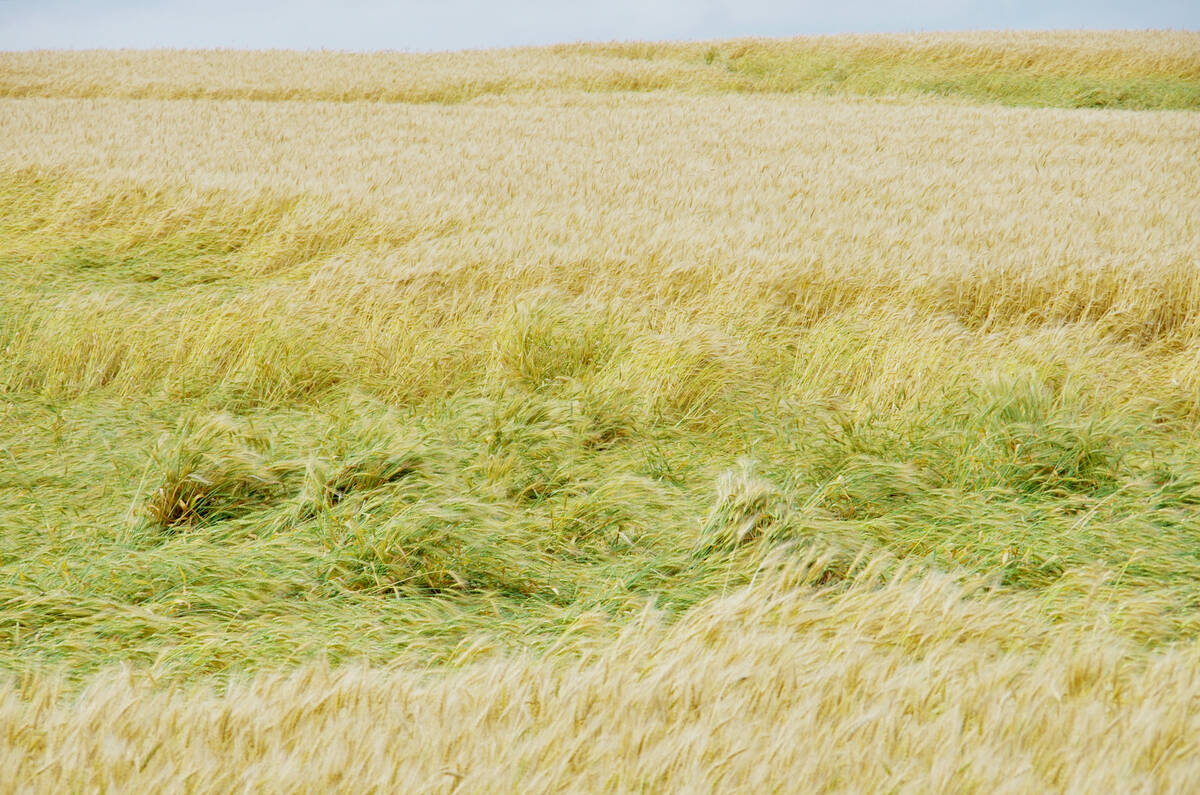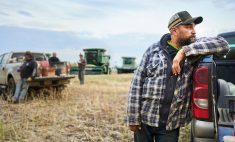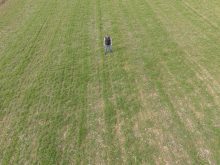Farming can exact a heavy emotional toll on even the hardiest of souls.
Between dealing with volatile markets, extreme weather and long hours of work, often in isolated conditions, it’s no surprise Canadian farmers suffer higher rates of anxiety and depression than the general public.
A University of Guelph study surveyed 1,132 Canadian farmers between September 2015 and February 2016 to measure signs of stress, depression and anxiety. The results indicated 33 per cent of respondents had probable cases of anxiety, 15 per cent had probable cases of depression and nine per cent had Hospital Anxiety and Depression Scale (HADS) scores indicating psychological distress. Also, results showed the average resilience scores of respondents were lower than the general population.
Read Also

Cereal lodging isn’t just a nitrogen problem
Lack of copper in the soil can also lead wheat and other cereal crops to lodge during wet seasons on the Canadian Prairies.
A more recent U of G survey conducted in 2021 found farmers’ mental health in Canada is worse than it was five years ago and worse than the general population in almost every way. Stress, anxiety, depression, emotional exhaustion, cynicism, suicide ideation and lowered resilience were all higher among farmers than the national average the survey’s research team found.
Other key findings include one in four Canadian farmers felt their life was not worth living, wished they were dead or thought of taking their own life during the previous 12 months, around 76 per cent of farmers surveyed were classified as experiencing moderate or high perceived stress and 83 per cent of farmers had lower resilience scores than the U.S. general population.
While those numbers are concerning, the situation is by no means hopeless, according to the CEO and co-founder of the National Farmer Mental Health Alliance (NFMHA), an organization that provides ag-informed training to psychotherapists and offers direct counselling services to farmers.
Build resiliency skills
Lauren Van Ewyk says the good news is farmers can develop resiliency skills to effectively deal with the negative effects of depression and stress to their mental health and well-being.
“The term resilience is derived from the idea that we bounce back, that we take on our original shape,” she says.
“To me, resilience isn’t so much going back to your original shape, it’s recognizing these elements of stress and how these difficult periods in our life teach us about ourselves and teach us new things, and we learn about perseverance. We want to recognize how this event or long period of stress has impacted us and changed us and what strengths do we build in the middle of it. Resilience teaches us to say, ‘I can actually feel this emotion, I feel safe enough to feel it and it doesn’t destroy me, it builds me.’”
Van Ewyk says the importance of developing resiliency skills is they allow individuals to deal head-on with any emotions they may be feeling rather than sweeping them under the rug and ignoring them.
One of the most important resiliency skills farmers can develop is self-compassion, she says. At its core, self-compassion is about extending compassion to yourself in instances when you may be experiencing perceived inadequacy, failure or general suffering.
“As farmers, we do this terribly,” says Van Ewyk, who runs a sheep farm with her husband in southwestern Ontario. “We think of self-compassion as self-indulgence or self-pity, but that’s not what self-compassion is. It’s about recognizing that I’m a wise person, and if I’m a wise person I’m still willing to learn.
“We have to break up with this perfectionist tendency. As farmers, we do this a lot. Did I plant my beans deep enough? Did I fertilize at the right time? Did I use enough fertilizer? We set ourselves up with this idea that our crop has to be perfect, but it doesn’t. We don’t need to be perfect.”
Another resiliency skill farmers should work on building is mindfulness, Van Ewyk says. Mindfulness is the ability to be present in the moment and be aware of what we’re doing rather than being overly reactive or overwhelmed by what’s going on around us. Van Ewyk says it’s “paying attention on purpose” by tapping into the five basic senses.
“Overall, it just talks about how we become addicted to the hurriedness and the adrenaline rush we get when we hurry,” she explains.
“We actually have to break up with that desire and come to this place where we recognize that taking a few minutes to enjoy our surroundings is really critical to resilience. If you’re a cattle farmer, the next time you go to your barn, take a couple of minutes to take a few breaths and enjoy being with those animals. If you’re a crop farmer, take a minute and look at that crop. Notice the colour and the shape and the texture of that crop.”
Process emotions
Another key to developing resiliency is to build coping skills, according to Van Ewyk. As part of this, she says it’s important for farmers to process any emotions they may be feeling rather than simply trying to tamp them down.
“The fact is we have four basic emotions: mad, sad, glad and scared. Pay attention to them. At any given moment on any given day ask yourself, ‘What am I feeling right now.’ If you have kids or a family, challenge them to do likewise,” she says.
“Have that conversation and what it is that you’re feeling. Once you recognize that feeling, it changes your brain and what happens in your brain, and we settle down. We go from this place of ‘Oh my goodness, there’s a bear in the room,’ to where there’s no threat and we’re just feeling scared or sad, and your brain goes, ‘OK, my mistake.’ It settles everything down and you can cope and build resilience.”
One example of a useful coping technique is deep breathing. Van Ewyk teaches many of her farmer clients to practice something called box breathing or square breathing each day when they wake up and again before they go to sleep. This deep breathing technique requires you to breathe in for four seconds, hold that breath for four seconds, then slowly exhale for four seconds and repeat the process until you feel re-centred.
“If you practice deep breathing, your brain will automatically take over and (help you breathe) when you need it,” she explains.
One resiliency tool that is often overlooked is spending time with others. This became even more important as a result of the COVID-19 pandemic, when many farmers have become more isolated than usual because of public health concerns.
“When we spend time with people that’s really a resilience-building skill. It’s super helpful,” she says.
“For some people, time with someone else is just one person. For people like me it’s, like, let’s have 80 people over, it will be fun. Regardless, people should become more intentional about connections. That means even if I don’t feel like going to this gathering Saturday night at the Legion, I still go because it’s important for me to connect with people. Oftentimes, if we’re dealing with mental health, our go-to position is to withdraw even further. What we know is the opposite is far more helpful, even though it can be hard.”
Van Ewyk says even though mental health has become less stigmatized than it once was, many farmers still have a tough time acknowledging they may have a problem and are often reluctant to seek professional help. She says many farmers are more likely to discuss their mental health struggles with their seed rep or implements dealer rather than a doctor or other medical professional with whom they have no previous relationship.
The key to getting help, she stresses, is to seek it out early rather than waiting until you have no other choice.
“A lot of times, when I work with farmers, the time to see a therapist for a lot of them is at a point where it’s a last-ditch effort. They’ve been dealing with stress for three or four years at a chronic level and they’re feeling hopeless and helpless,” she says.
“Ideally, what I would prefer is if farmers, when they think they’re doing pretty well, check in with a therapist and say, ‘I think I’m feeling pretty well, but I want to make sure I’m feeling well.’ Then we can figure out your strengths and what you use to compensate for those days that are really stressful.”
















